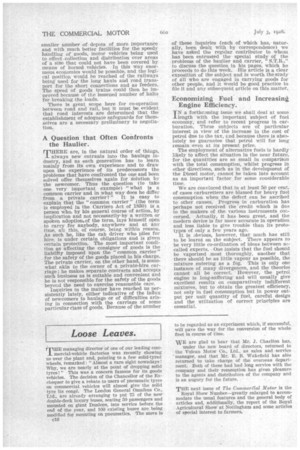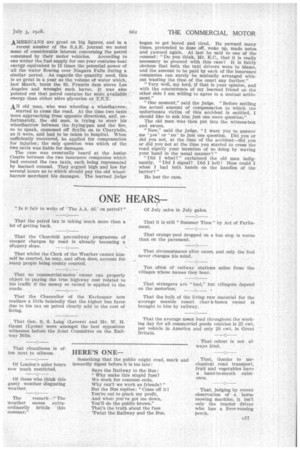Loose Leaves.
Page 38

Page 39

If you've noticed an error in this article please click here to report it so we can fix it.
THE managing director of one of our leading commercial-vehicle factories was recently showing us over the plant and, pointing to a few solid-tyred wheels, remarked : "Almost a rare sight nowadays ! Why, we are nearly at the point of dropping solid tyres!" This was a concern famous for it goods vehicles. The decision of the Chancellor of the Exchequer to give a rebate to users of pneumatic tyres on commercial vehicles will almost give the solid tyre its conge. The London General Omnibus Co., Ltd., are already arranging to put 75 of the new double-deck luxury buses, seating 50 passengers and mounted on giant Dunlops, into service before the end of the year, and 100 existing buses are being modified for mounting on pneumatics. The move is
to be regarded as an experiment which, if successful, will pave the way for the conversion of the whole fleet in course of time.
WE are glad to hear that Mr. J. Charlton has, under the new board of directors, returned to the Vulcan Motor Co., Ltd., as sales and service manager, and that Mr. E. B. Wakefield has alSo returned -to take charge of the overseas department. Both of these had had long service with the company and their resumption has given pleasure to the agents and distributors of the company and is an augury for the future.
THE next issue of The Commercial Motor is the
Royal Show Number—greatly enlarged to accommodate the usual features and the general body of articles and, additionally, the report of the Royal Agricultural Show at Nottingham and some articles of special interest to farmers. AMERICANS are great on big figures, and in a recent number of the S.A.E. journal we noted some of considerable interest concerning the petrol consumed by their motor vehicles. According to one writer the fuel supply for one year contains heat energy equivalent to 15 times the potential power of all the water flowing over Niagara Falls during a similar period. As regards the quantity used, this is as great in a year as the volume of water which, last March, burst the St. Francis dam above Los Angeles and wrought such havoc. It was also pointed out that petrol contains far more available energy than either nitro glycerine or T.N.T.
AN old man, who was wheeling a wheelbarrow, started to cross the road. At the time.two taxis were approaching from opposite directions, and, unfortunately, the old man, in trying to steer his wheelbarrow between the frying-pan and the fire, so to speak, cannoned off Scylla on to Charybdis, as it were, and had to be taken to hospital. When sufficiently recovered, he applied for compensation for injuries; the only question was which of the two taxis was liable for damages.
The case was eventually heard at the Assize Courts between the two insurance companies which had covered the two taxis, each being represented by learned counsel. They argued high and low for several hours as to which should pay the old wheelbarrow merchant his damages. The learned judge began to get bored and tired. He yawned many times, pretended to doze off, woke up, made notes and yawned again. At last he said to one of the counsel: "Do you think, Mr. K.C., that it is really necessary to proceed with this case? It is fairly obvious that both the taxi drivers were to blame, and the amount to be paid by each of the insurance companies can surely be mutually arranged without wasting the time of the court any further."
"Very well, my lord, if that is your opinion, and with the concurrence of my learned friend on the other side I am willing to agree to a mutual settlement."
"One moment," said the judge. "Before settling the actual amount of compensation to which the unfortunate victim of this accident is entitled, I should like to ask him just one more question."
The old man was then put into the witness-box and sworn.
"Now," said the judge, "I want you to answer me 4yes ' or 'no' to just one question. Did you or did you not, at the time of the accident—did you or did you not at the time you started to cross the road signify your intention of so doing by waving your hand in the usual manner?"
"Did I what?" exclaimed the old man indignantly. "Did I signal? Did I hell? How could I when I had both hands on the handles of the barrer?"
He lost the case.












































































































